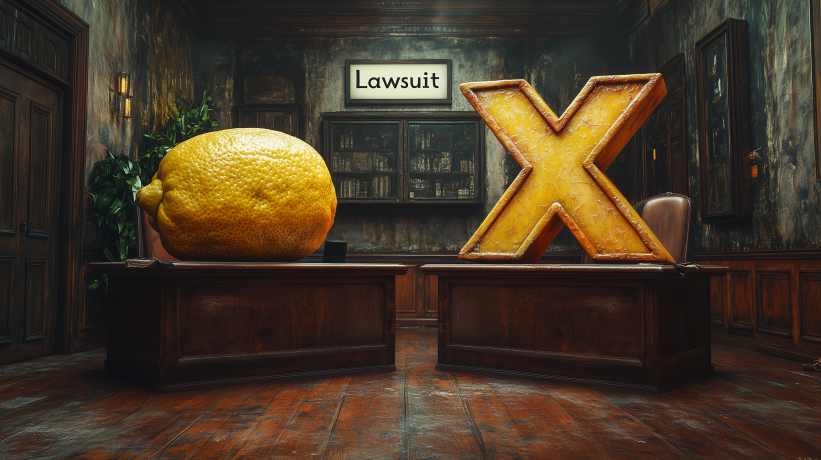
Don Lemon's lawsuit against Elon Musk's X Corp exposes the high-stakes world of media partnerships and corporate promises. This legal battle highlights the importance of clear contracts and due diligence in navigating lucrative but potentially risky deals with tech giants.
by LawInc Staff
August 1, 2024
Former CNN anchor Don Lemon has filed an explosive lawsuit against Elon Musk and his company X Corp (formerly Twitter), alleging fraud, misrepresentation and breach of contract over a failed content partnership deal.
This overview breaks down the key facts, allegations and legal issues in the case. Learn the story behind the lawsuit, the specific laws at issue, and what it all means.
1. Understand the Parties & Background
-
- Don Lemon: Veteran journalist, former CNN anchor from 2006-2023.
- Elon Musk: Billionaire, Owner of X Corp. (formerly Twitter), Tesla and SpaceX.
- X Corp.: Musk’s social media company, owner of platform X (formerly Twitter), based in San Francisco.
- Musk’s Takeover: Musk bought Twitter for $44B in Oct. 2022, fired top execs, laid off staff, and reinstated controversial accounts.
- Advertiser Exodus: Twitter ad revenue dropped 60% as brands grew wary of Musk’s tumultuous leadership.
Key Context
-
- Lemon was fired by CNN in April 2023 after 17 years, leaving him a free agent in the media world but in a vulnerable position.
- Musk saw opportunity to recruit Lemon to X and use his respected reputation to lure back skittish advertisers.
- X Corp. was desperate to boost ad revenue after major brands fled the platform following Musk’s erratic decisions.
- Musk publicly courted Lemon to join X, sensing his credibility could help rehabilitate the site’s damaged image.
2. Review the Partnership Negotiations
-
- June 2023: Musk tweets it would be “great” to have Lemon and other high-profile hosts join X’s platform.
- June 16, 2023: Musk tells Lemon by phone: “I want you on the [X] platform” and “this is what you should be doing,” urging him to sign on.
- Dec. 14, 2023: Lemon meets X CEO Linda Yaccarino and exec Brett Weitz, who promise X’s “full support” if he partners with them.
- Dec. 2023: X execs press Lemon to join as more major advertisers halt spending, claiming he would “make money faster than you think!”
Why It Matters
-
- The persistent campaign to recruit Lemon shows X was targeting him to hone in on his credibility and followers.
- Musk and top X execs were intimately involved, reflecting the high stakes of landing a partnership with Lemon.
- Promises of creative control, lucrative pay, and full corporate backing were key to persuading Lemon.
- The timing and tone of the overtures suggests X was eager to use Lemon as the antidote to its advertiser exodus.
3. Examine the Alleged Misrepresentations
-
- No Formal Contract Needed: Musk told Lemon there was no need for a written agreement, saying he didn’t need to “fill out paperwork.”
- Complete Editorial Control: X execs assured Lemon he would have “full authority” over his content, even if they disagreed with it.
- Guaranteed Compensation: On Jan. 8, 2024, X agreed to pay Lemon $1.5M for one year, including a $200k signing bonus, with renewal options.
- Lucrative Incentives: Deal terms included 60% of ad revenue share, bonuses up to $1M for follower counts, and 10% referral commissions.
- Rights to Content: Lemon was told he would own all content he created for X and the underlying intellectual property.
Lemon’s Argument
-
- These promises were made to induce Lemon into the deal while X had no intent to actually honor them.
- X exploited Lemon’s trust and credibility to falsely signal to advertisers that its platform was brand-safe again.
- Lemon would not have agreed to partner with X if he knew its true motives and that it would renege on its word.
- X misled Lemon so it could boost ad sales by promoting their association, then discarded him once it reaped the benefits.
4. Analyze the Causes of Action Alleged
-
- Fraud: X intentionally misled Lemon with false promises to induce him to enter the deal and promote the platform to advertisers.
- Negligent Misrepresentation: If not intentional, X’s deception of Lemon was still reckless, without regard for the truth.
- Misappropriation of Name & Likeness: X exploited Lemon’s reputation for commercial gain without consent or compensation.
- Breach of Contract: X reneged on its agreement to pay Lemon and give him content control as promised.
- Unjust Enrichment: X was unjustly enriched by profiting off its use and promotion of Lemon’s brand.
Legally Speaking
-
- Fraud requires: 1) false representation 2) knowledge of falsity 3) intent to deceive 4) reliance and 5) damages. Lemon argues X faked promises to trick him.
- Negligent misrepresentation is similar but doesn’t require intent, just a lack of reasonable basis for believing the statements were true.
- Misappropriation occurs when one’s name, image or likeness is used without permission for another’s benefit. Lemon says X wrongly capitalized on his brand.
- For breach of contract, Lemon must show an agreement existed, he performed his end, X did not, and it caused him harm. The lack of a formal written contract may pose challenges.
- Unjust enrichment allows one to recover benefits unfairly retained by another. Lemon seeks restitution for X profiting off him without paying.
5. Follow the Alleged Damages
-
- Thousands in Out-of-Pocket Costs: Lemon says he spent over $100,000 creating a media company, studio, and production team for X content.
- Guaranteed Compensation: Lemon was promised $1.5M, including a $200K signing bonus, for a 1-year deal, which X failed to pay.
- Ad Revenue Share: Deal terms entitled Lemon to 60% of ad revenue generated from his content, which he has not received.
- Performance Incentives: Lemon was to earn up to $1M in bonuses for hitting follower milestones, plus 10% of creator referral revenue.
- Reputational Harm: Lemon alleges the fiasco has damaged his professional brand, credibility, and future prospects.
Remedies Sought
-
- Compensatory damages to reimburse Lemon’s financial losses from relying on X’s promises and cover his unpaid compensation.
- Punitive damages to punish X for allegedly fraudulent, malicious conduct and deter such corporate malfeasance.
- Injunctive relief to stop X from further use of Lemon’s name, brand and likeness to promote itself.
- Restitution for the unjust financial enrichment X gained by capitalizing on Lemon’s reputation without paying him.
Conclusion

Don Lemon interviewed Elon Musk in the first and only episode of his short-lived show on X after which their partnership imploded.
The lawsuit offers a rare glimpse into the high-stakes dealings between media personalities and tech moguls in the rapidly evolving social media landscape. Lemon’s case will likely hinge on his ability to prove X knowingly made false promises to induce him into a one-sided partnership.
Key Takeaways on the Lemon Lawsuit
Top 3 Lessons
-
- 1. No matter how prestigious the parties, get all agreements in writing to avoid disputes over terms and intent down the line.
- 2. Beware tech leaders making lofty promises to win your business when their platforms are facing financial and reputational crises.
- 3. If a deal sounds too good to be true, dig deeper – if they really need you, there’s probably a catch they’re not disclosing.
Key Questions
-
- Q: Will the lack of a formal written contract doom Lemon’s claims?
A: Not necessarily – if he can show evidence of clear promises and agreement on material terms, an oral contract may suffice. - Q: Does Lemon have a duty to mitigate his damages by seeking to earn income elsewhere?
A: Likely yes – he can’t just sit back and let losses accrue, but must make reasonable efforts to find comparable work to offset damages. - Q: Could X argue Lemon is trying to capitalize on Musk’s deep pockets with trumped up allegations?
A: They could, but it would be unwise unless they have proof Lemon is lying, as it may just inflame the jury against a billionaire defendant.
- Q: Will the lack of a formal written contract doom Lemon’s claims?
Disclaimer
This article discussing the Don Lemon v. Elon Musk lawsuit is provided for general informational and educational purposes only. It is not intended as formal legal advice and does not create an attorney-client relationship. Laws and circumstances may have changed since the publication date. For a personalized case evaluation and legal guidance, please consult a qualified attorney licensed in the relevant jurisdiction.
Need Legal Help?
If you need legal assistance, in any field of law, our free concierge service can connect you with experienced attorneys in any practice area and state. Contact us to learn more.
Also See
“We Never Signed Anything!” When Verbal Contracts Turn Toxic in California
One Musk to Rule Them All: The Antitrust & Governance Gauntlet Facing a Unified Elon Empire










